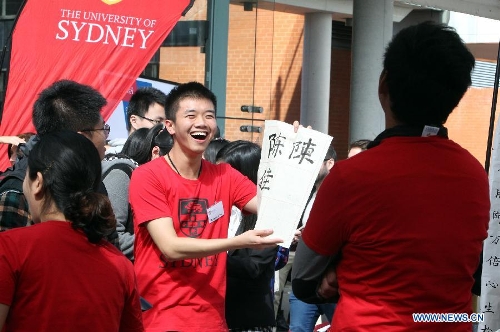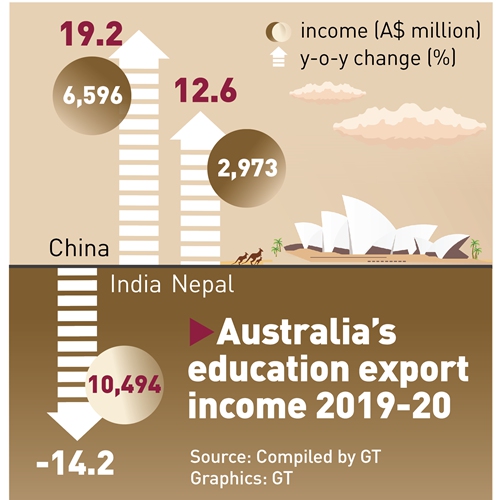
A student shows a calligraphy works during a gathering on the occasion of the Mid-Autumn Festival at the Sydney University, Sept. 8, 2014. The Mid-Autumn Festival, which falls on Sept. 8 this year, is a traditional Chinese festival for family reunions, during which folks will enjoy the full moon together and eat mooncakes. (Xinhua/Jin Linpeng)

Graphics: GT
Most Australia-China education businesses reported a fall in business confidence and deteriorating attitudes toward Australian education in China during the past year amid fraught bilateral ties and the COVID-19 pandemic, and most Australian businesses reflected difficulty in diversifying their markets, an industry survey showed.
Bilateral tensions had a significant negative impact on business over the past year. The vast majority (81 percent) believe that recent changes in the bilateral relationship had an overall negative impact on business in 2020. More than three in five (62 percent) believed that attitudes in China toward Australian education have deteriorated, according to an agribusiness survey report released by the China-Australia Chamber of Commerce (AustCham China) on Monday.
Over half of the respondents indicated their confidence in the Chinese market had decreased in 2020. One-quarter said there had been no change. A small proportion (17 percent) said their confidence rose.
The top three business risks facing the education sector were divided equally among worsening Australia-China trade relations (71 percent) and ongoing COVID-19 disruptions (70 percent), with substitution risk (53 percent) for Australian education moving to other countries, according to the survey.
Schools - both primary and secondary - showed the largest decrease in confidence (62 percent) in the Chinese market, with universities not far behind (57 percent).
Nick Coyle, CEO of AustCham China, said "This is an increasingly anxious time for providers and students alike. The importance of the education sector to the Australian economy, its dedicated workforce and the hundreds of thousands of students and their families, cannot be understated."
International education is Australia's fourth-largest foreign exchange earner, worth A$38 billion ($26 billion) annually. It is the largest service-based export and supports about 240,000 jobs and economic growth. According to Minister for Education Dan Tehan, in 2019 international education contributed A$37.6 billion to the Australian economy, an increase of A$5 billion on the previous year.
China is the biggest source of international students in Australia. Data released by the Australian Department of Home Affairs showed that more than 220,000 students from the Chinese mainland were registered in Australia in 2020, down from 260,000 in 2019.
According to the Australian Bureau of Statistics, China contributed A$10.5 billion in income, the largest amount, followed by India and Nepal, to Australian international education. The sector posted total exports of A$37.5 billion in the 2019-2020 fiscal year (July 1, 2019-June 30, 2020).
Export income to China in 2020 declined 14.2 percent from the previous fiscal year.
"International student education, as one of the most important pillars of Australia's economy, has reaped enormous revenues from students from China, which has been fuelling Australian universities' teaching and research, pushing up their international rankings," Chen Hong, director of the Australian Studies Center at the East China Normal University in Shanghai, told the Global Times on Monday.
In addition to the health crisis, the anti-China policies adopted by the Morrison administration have made things worse, since they fostered an unfriendly or even hostile climate for Chinese students, directly resulting in a drop of confidence in Australia as a safe and friendly destination of education among Chinese students and their parents, Chen noted.
"If Canberra maintains its current anti-China attitudes and policies, it will be difficult to regain a favorable attitude among Chinese students and their parents. Confidence needs to be nurtured, not taken for granted," Chen said.
Chinese investment in Australia plummeted 61 percent to $783 million in 2020, the lowest in six years, amid the bilateral rift that that started intensifying last year, data from the Australian National University's Chinese Investment in Australia Database showed.
"Chinese investment in Australia dropped sharply even though China's overall foreign direct investment rose 3.3 percent last year, and the reason for that is something that the Australian side needs to reflect on," China's Foreign Ministry said Monday. "Australia's repeated obstruction of Chinese investment, citing so-called 'national security' reasons, has severely affected Chinese investors' confidence," the ministry said.
Respondents in the survey were asked how easy it would be to diversify their China-related business to other countries in the region. More than half said it would be difficult, split equally between very difficult (28 percent) and difficult (27 percent), while about 20 percent said it would be easy.
Qin Lin, an associate research fellow at China's National Institute of Education Sciences, told the Global Times that there are other alternatives for Chinese students wanting to study overseas, such as the UK and Canada. She predicted that there won't be much improvement in 2021 in terms of Chinese students heading to Australia.
China's Ministry of Education in early February issued a fresh warning on studying in Australia due to recent anti-Chinese protests in the country.
"Despite some bilateral headwinds, Australia is still a terrific destination for students from China, and we expect demand to bounce back alongside international travel," Coyle told the Global Times on Monday, adding that both sides have handled the COVID-19 pandemic well.
"I would hope that both countries collaborate to map out a pathway toward the easing of border restrictions and the resumption travel. This will be a crucial aspect in the success of the sector's recovery, while not forgetting how important it is that young Australians have the opportunity to study and broaden their horizons in China," he noted.





